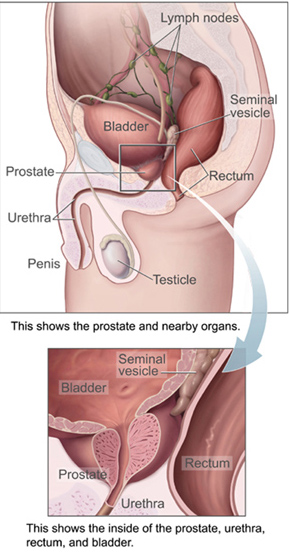What is the prostate?
The prostate gland is walnut-sized organ located just below your bladder.
It is part of the male reproductive system and its function is to produce some of the fluid that carries sperm when you ejaculate. About 50-75% of semen is fluid that comes from the prostate. The rest is fluid from the seminal vessels and actual sperm. That fluid from the prostate is rich in nutrients and helps to protect and support the sperm on their long journey to fertilisation.
What can go wrong with my prostate?
There are four main problems that the prostate can encounter.
- Prostatitis
- Benign Prostatic Hyperpalsia (BPH)
- Prostatodynia
- Prostate Cancer
Of these, my focus is primarily on prostate cancer. If you have received a cancer diagnosis from your GP, by all means, read on but I also encourage you to visit my appointments page and make a time to see me. The earlier treatment begins, the better the outcome.
Can I live without it?
It may be that your treatment will require the removal of the prostate, a procedure we call prostatectomy. Unlike organs like the appendix and the tonsils, which can be removed with no discernible change to your daily life, removal of the prostate can have some side effects that may affect your lifestyle.
Those side effects may include:
- Difficulty in getting or maintaining an erection
- Orgasm without ejaculation (100%)
- Loss of sex drive (uncommon)
- Urinary incontinence
Some of these side effects will be temporary, others may be permanent. The difference is often in the quality of the procedure and the skill of the surgeon performing that procedure. I use the most advanced robotic surgery techniques. These techniques are what we call “minimally invasive” – that is, I insert small instruments into your abdomen and perform “keyhole” surgery with the aid of the robot machine.
With the robot surgical technique, there is less post operative pain, less risk of bleeding, lower risk of wound infection and an earlier return to activity of daily living. The better view obtained by the magnification of the robot telescopes improves the identification of the anatomical fascial layers during dissection of the nerve bundles that control your erections.
The success of your surgery is determined by the experience of your surgeon and their surgical techniques.

